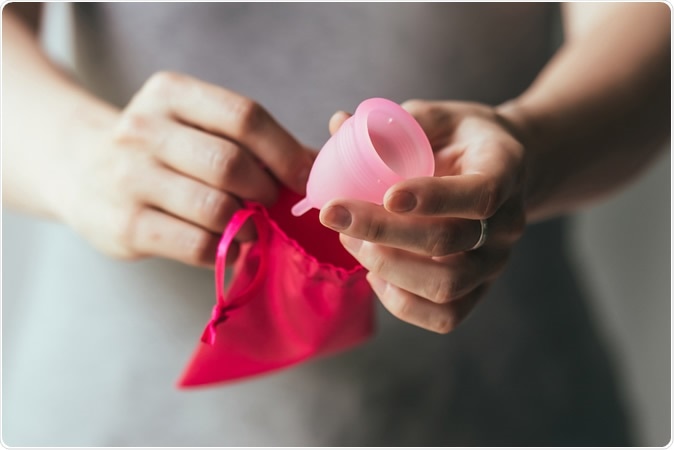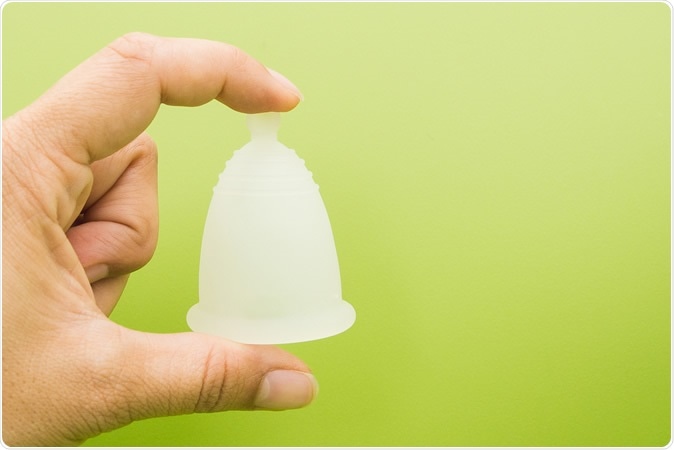
Menstrual cup. Image Credit: Yulia Grigoryeva / Shutterstock
Menstrual bleeding is a fact of life for 2 billion reproductive age females for on average 65 days a year. Most of them use single-use or reusable absorbable pads or other materials to catch the blood. Menstrual cups, however, are just as good at this as sanitary pads or tampons, and much less expensive.
Menstrual cups collect the blood flow for later disposal, allowing complete mobility to the user without fear of staining or leakage. Both vaginal and cervical cups are available. While normally designed for reuse for up to 10 years, single-use cups are also being sold.
These bell-shaped devices are made of silicone, rubber, latex or elastomer, all medical-grade. They have a pliable firm rim and a thin soft receptacle that can collect 10-38 mL of blood. They need to be emptied every 4-12 hours depending on the flow and capacity.
The research conducted by the Liverpool School of Tropical Medicine (LSTM) aimed to find out on how sanitary products, and in particular, menstrual cups, meet expectations on dealing with menstrual blood flow in a safe, acceptable and inexpensive manner. In low-income groups, menstruation and related issues represent a significant challenge to educational and workplace experiences and goals. Some possible dangers with low-standard sanitary products include urinary tract infections, or the risk of sex-related violence.
The study covered a wide range of income scenarios to sum up the situation regarding the cost, availability, acceptance rates and environmental aspects of these devices, in addition to exploring the available educational materials. Researchers found that there was an initial training curve to adopting the menstrual cup for routine use. This lasted 2-5 months, and high continuation rates were associated with practice, peer support and training.
Overall there was found to be a positive impact of the cup on women’s lives. In fact, 70% of surveyed women in 13 studies preferred to continue their use once they learned how.
Leakage of menstrual blood was similar or often less with the use of the cups (at 2% to 31%) compared to other menstrual products. Some factors contributing to leakage might be the need for a larger cup, excessive bleeding, anatomical variations, or improper insertion of the cup.

Use of menstrual cups also meant fewer changes were required during the cycle. Image Credit: Diana Zuleta / Shutterstock
The use of a menstrual cup did not increase the rate of infections in the birth canal, with a tiny fraction of participants reporting severe pain or vaginal wounds. Allergy and the need for professional help to remove the cups were rare with vaginal cups, though the latter was more common with cervical cups. Yeast and bacterial infections, including toxic shock syndrome, were not increased in any study, while many reported a decrease. Sexually transmitted infections declined significantly in some studies following the use of menstrual cups, probably because the girls did not have to have transactional sex to earn money for the purchase of other sanitary products.
In fact, economically menstrual cups make a lot of sense, with no need for either sanitary pads or soap. Women and girls also appreciated the amount of time saved on doing laundry, and the increased privacy of their menstrual self-care. The use of a cup represents only 5% or less of the average cost of using pads or tampons, and reduces the plastic waste by almost 94% to 100%.
The use of menstrual cups also meant fewer changes were required during the cycle, compared with either tampons or pads. This was linked to better school attendance, higher concentration and improved performance.
Difficulties associated with the cup’s use in low- or middle-income settings include finding a suitable setting to clean and store it, and to empty it when in use. The lack of water was another challenge in certain locations. These obstacles did not deter women in such settings from using it, however.
A small case series reported the expulsion of an IUD following the use of a menstrual cup. This may mean that other methods of contraception should be adopted while using this device.
Surprisingly, in high-income settings, only 11% to 33% of eligible women even knew about the cup, and even on websites which inform women about such matters, only 30% mention this option.
Author Anna Maria van Eijk says menstrual cups can end period poverty: “It is really important that menstrual cups be considered as a potential option for women and girls everywhere. Cups can last up to 10 years and the data suggests that this means that period associated costs could be significantly reduced as well as being beneficial in terms of waste saving.” This means that programs to improve menstrual health should probably include education on using menstrual cups and provide follow up as required, especially among non-profit organizations working in the developing world.
Source:
Journal reference:
Menstrual cup use, leakage, acceptability, safety, and availability: a systematic review and meta-analysis
Anna Maria van Eijk, PhD, Garazi Zulaika, MPH, Madeline Lenchner, MSc, Linda Mason, PhD, Prof Muthusamy Sivakami, PhD, Elizabeth Nyothach, MSc, et al., DOI:https://doi.org/10.1016/S2468-2667(19)30111-2, https://www.thelancet.com/journals/lanpub/article/PIIS2468-2667(19)30111-2/fulltext